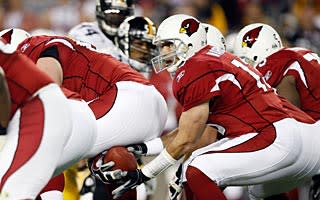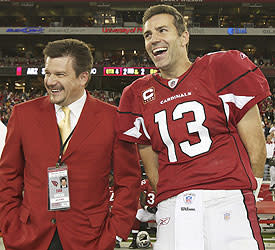Warner mess a setback for Cardinals owners

Warner threw for 377 yards and three touchdowns in Super Bowl XLIII against Pittsburgh.
(Streeter Lecka/Getty Images)
Even after the most compelling season their eyes have ever known, the ownership of the Arizona Cardinals can't find the vision to navigate beyond its petty urges. One month removed from the most uncommon of hours – one of the most memorable Super Bowl appearances in NFL history – the Bidwill family is poised to strike down its own success.
Kurt Warner, the Cardinals' star quarterback and the best thing to happen to Phoenix since air conditioning, will spend time this week flirting with the San Francisco 49ers. Not because he wants to, but because the Arizona ownership can't be bothered to simply do the right thing: pay Warner the money he is worth. According to a source close to Warner, he has been offered what amounts to a one-year deal, with one season at $10 million, and a team option for a second year at the same terms. That's well short of the commitment Warner was hoping for: a two-year pact for around $14 million per season – a number that comes out to slightly less than the average of the top five quarterback salaries in the league.
So here we are, with Arizona's competitive fate hanging in the balance, all because the Cardinals believe Warner is worth only $1.5 million more than what the Tennessee Titans have guaranteed to Kerry Collins. You wanted to believe this was a franchise capable of finally making the right move, and that when Bill Bidwill hoisted the NFC championship trophy in January, he was lifting up the beacon of a new era. But if that were true, the family would have stepped in by now and told the front office to get Warner's deal done.
This is what winning owners in the NFL do – they recognize the foundation of their team, and they find a way to keep it in place. The Indianapolis Colts have done it with Peyton Manning. The Pittsburgh Steelers have done it with Ben Roethlisberger. Indeed, every team worth its salt finds a way to deal with the financial realties of a franchise quarterback. And don't kid yourself. Even at 38 years old, Warner will be just that over the next two seasons. Subtract him from this team, and Arizona goes 5-11 next season.
But this situation only tells us what we already know: The Bidwill family can't be counted upon. Rather than step up and find a way to pay their most important player what he's truly worth, they've allowed the front office to put on a poker face and force Warner into an awkward free agent walk of shame. They've taken a gamble that Warner wouldn't seriously consider the 49ers, while simultaneously wagering all their chips on Matt Leinart, who has never been close to taking over the starting job over the last two seasons. All the while, they've allowed a ridiculous message to seep out that Warner is being greedy, and eating up key cap space. Rather than doing the right thing for a player who makes their franchise better, they've kicked a little dirt on him in hopes of saving money.
This is what makes other executives in the NFL roll their eyes, all too familiar with the way the Bidwill family conducts its business. Executives who know the golden rule – the one that says when you've got a quarterback who is holding your team together at the seams, you don't engage in financial Russian roulette. Then again, how would the Cardinals know any better? When was the last time they had a quarterback worth paying?
Here's a little truth about what Warner is asking. First, it's time to put down all of this absurdity about the current state of the economy. The day the Bidwills cut a refund check to their season-ticket holders for decades of futility is the day they can afford to ask a player to take a discount. No matter how much bellyaching the Phoenix media wants to do about the economy, a universal reality of pro sports will endure: Real-world economics rarely apply to owners and players who make tens of millions of dollars every year. Warner has helped make the Cardinals untold amounts of money, making him worth every penny of his salary.
Second, a deal with Warner will not put the Cardinals in significant salary cap trouble. The NFL gave a universal $4 million bump in the 2009 salary cap late last month, from $123 million to $127. According to a league source, that boost put the Cardinals well over $30 million in "functional" cap space for 2009 – meaning the team has well over $30 million in spending room to be solely devoted to free agents and rookies. And even that is a fluid figure, too.
As we've seen over the last several seasons, experienced front offices can manipulate current deals to create or devour salary cap space as they see fit. There are always deals that can be tweaked (Larry Fitzgerald) or extended (Karlos Dansby) or cut completely (Edgerrin James) to help facilitate a need for additional money. So let go of the notion that the Cardinals can't afford it. If the Indianapolis Colts can handle Manning's $21.2 million in base salary in 2009, Arizona can accommodate Warner's yearning for $14 million.

The tone has changed between Warner, right, and team president Michael Bidwill.
(Ross D. Franklin/AP Photo)
And stop for a moment and ponder the question of Warner's true worth. Look at the broader picture, and you'll see a player who maximized Fitzgerald over the last two seasons and helped make him worth his $10 million salary. He helped turn Anquan Boldin into one of the biggest bargains in football. He helped transform Steve Breaston from a return specialist to a legitimate No. 2 option. He spearheaded a Super Bowl run that made the Bidwill family millions in additional revenue, both from the home playoff games and merchandising. And he did it while earning the 10th-highest quarterback salary in 2008, and 18th-highest quarterback salary in 2007 (a year in which he threw 27 touchdowns).
Meanwhile, he did it by portraying everything that is right with NFL players. He never had to answer for embarrassing internet photos. He never complained about the coaching staff and demanded a trade. He never undermined the young quarterback that was drafted to be the team's future. He was never arrested. All he did was put up gaudy stats and engineer the most exhilarating playoff run in franchise history. All he did was make people think that maybe – just maybe – this wasn't the same old disappointing Cardinals franchise the world had come to expect. Indeed, if Warner made any mistake, it was putting his faith in the Cardinals and suggesting he only wanted to play in Arizona.
So this is how he is being repaid. With haggling over what should be a no-brainer contract, and back-stabbing about who is truly being greedy in the current predicament.
The Cardinals need to realize they are in uncommon times. They stand ready to distance themselves from an embarrassing era. But first they need to understand they are a Super Bowl franchise, and that maintaining that image going forward takes sacrifice and creativity – both in the pocketbook and with the salary cap.
Finally, the Cardinals are learning what it takes – and who it takes – to grasp the ultimate success. But that grip comes with a price tag. And if they aren't willing to pay a player who deserves it most, when are they?
